On April 21 this year, I was in Odessa, on the Ukrainian Black Sea coast. I was booked on a scheduled Ryanair flight from Katowice in Poland the following evening at 8.25pm. No flights had flown out of Poland or into England for a week, but I had suddenly been informed that I had 27 hours in which to get at Katowice airport.
I have written a lengthy piece about this journey, giving history, sundry political and economic observations, and a description of just how I came to be in Odessa on April 21. Unfortunately, this blog post somehow managed to come to over six and a half thousand words, which is perhaps excessive.
Therefore, I have done some editing. The introduction to the post that gives all the background is on my own blog here. On Samizdata, I will post from the point where the action starts.
The first step was to get from the Black Sea coast to the Polish border. There was a train departing Odessa for Lviv at 7.00pm. I purchased a ticket. There are three classes of ticket for overnight trains in the former USSR. The cheapest, 3rd class, is called platzkart. Platzkart carriages contain 54 beds. There is very little privacy, inadequate toilent facilities, and travelling platzkart has a certain reputation. (“The basic layout is essentially a copy of the old slave ships, or perhaps the GULAG camps”). However, travelling this way is very cheap. 2nd class is kupe. Carriages contain 9 compartments, each containing four beds, with an upper and lower bunk on either side of the compartment. There is more privacy, and more comfort and space. Tickets cost about twice the cost of platzkart – for a journey from Odessa to Lviv my kupe ticket cost the equivalent of about £10. 1st class is spalny wagon, which consists of compartments containing two beds each. This costs three or four times as much as kupe – not hugely expensive by western European standards, but a considerable premium. So, I choose kupe. I bought a ticket to Lviv. Even this is not always easy when timetable information in the station is entirely in Cyrillic, you have no common languages with the railway staff, and the very badly paid staff themselves received their customer service training in the Soviet Union. But I managed it.
Of course, in a kupe carriage, you share a compartment with three other people, and it is luck as to who you get. I prepared myself for the journey. The custom on long Eastern European train journeys is for passengers in the same train compartment to have something resembling a picnic in the compartment. People pack food – often things like cheese, bread, and cold meats – and these things are shared at meal times. I went to a shop near the main train station and purchased some bread, cold sausage, cheese, and tinned fish, and was prepared for a little socialising if the people sharing the compartment were friendly. I also made sure I had a charged laptop with a spare battery, the previous evening’s episode of Lost on the hard disk, an assortment of movies, and a couple of good books.
So I was ready. I boarded the train and was guided to my compartment. There were three other people with me: a respectable looking married couple about my own age, and a younger man. I sat down. The younger man insisted on speaking to me and the other passengers incessantly in Russian. There was a lot of beer, vodka, and a few inscrutable food items on the table. His breath smelled of something including but not limited to beer. He insisted on talking incessantly for the half hour or so I sat there with the two other. The married couple sat there largely in silence with rather stern expressions on their faces, although the husband greeted me in accented but quite decent English.
After about a half hour of this, the married couple got up departed the compartment. The younger drunk Russian stayed for a bit longer, and attempted to get me to share his beer. After a while I perhaps foolishly took a swig. A few minutes after this, he attempted to get me to share the marijuana he had stashed in his sock. He wasn’t just drunk. I declined on the marijuana. After a time he also got up and left the compartment. (Yes, he was probably Ukrainian rather than Russian, but as a state of mind, one enters Russia when one gets on a train anywhere in Russia, Ukraine, or Belarus. One just does).
Not long after this, the husband (but not the wife) of the other couple returned. As it happened he spoke very decent English: accented when he spoke but his comprehension was excellent; the sort of English that someone has when he has spent time working in places and environments where it is useful to be able to speak English and where it has been picked up along the way. He asked me where I was from. When I told him I was Australian he commented that my English was easy to understand. Many Australians speak heavily accented and idiomatic English, but I didn’t. I spoke heavily accented and idiomatic English for a couple of sentences, and we both laughed. He told me about his travels in the Middle East and Asia. We compared notes on Dubai and Malaysia. He seemed a nice bloke – exactly the sort of company one hopes for in a train in a foreign country.
However, this was not to last. His wife soon returned and they had a discussion in Russian. I was told that they were going to a compartment in another carriage, as “he” would undoubtedly return soon, and they needed to get some rest. I was not unsympathetic to their point of view, but I was not pleased by this development. Given the choice of sharing a compartment with two sensible people and a drunk and stoned Russian nutter, or with just a drunk and stoned Russian nutter, I knew which I preferred. This clearly showed on my face. My English speaking friend translated one last phrase from his wife, directed at me. “Good Luck”.
Of course, I was not expecting good luck, and I did not get it. My drunk and stoned friend returned a while later. By this time I had settled down on my top bunk with a book, but he still wanted my attention. More incessant speaking. Attempts to slap my hand with his hand. Attempts to shove beer and vodka in my direction, followed by more incessant talking and unpredictable reactions when I refused. After about half an hour of this, he departed again, thankfully.
In order to comprehend the full experience of the rest of this journey, more of the customs of Russian train travel need to be revealed. Firstly, each carriage has a provodnitsa (provodnik if male, but they usually seem to be female) who is an attendant who checks tickets, provides bed linen, cleans compartments, offers coffee at the start and end of the journey, and is generally in charge of the carriage. Secondly, overnight trains make long stops. At a major station the train may stop for up to an hour in the middle of the night. When this happens, vendors selling food, drink, and other items appear on the platforms of the station, and passengers often get off to buy items from them.
Consequently, my journey developed a rhythm. My obnoxious friend would come into the carriage and irritate me for half an hour or more, before getting restless. At that point, he would vanish to somewhere else on the train for a time. If there was a stop, he would clearly leave the train. Shortly afterwards, he would reappear in the compartment with various items, and would talk incessantly in Russian and would thrust whatever he had bought in my face, and perhaps attempt to high-five me again.
What can I say? Having two smoked fish and a bottle of Ukrainian beer thrust in your face at midnight when you are trying to sleep is one of those things that is perhaps better to write about later than to experience at the time, although admittedly it does make for a good story later.
The next phase in the rhythm would be that the items that had been purchased on the platform at the stop would be placed on the table in the compartment, and my obnoxious friend would again get restless and wander to somewhere else in the train. At that point the provodnitsa (who was aware she had a problematic passenger) would come into the department and take away all the beer, vodka, illicit drugs, smoked fish etc that were on the table. There was no direct confrontation – just a sort of attempt to moderate the problem. In one of these intervals I got my laptop out, and managed to watch Lost. I pulled the memory card out of my camera, and was just starting to sort out my holiday snaps when my friend returned, so I put the laptop away as I did not know how he would respond. Similarly, I was reluctant to get out my own food, as I did not know whether he would demand some as part of Russian train etiquette, or any of a number of other weird reactions.
At about 1am, the provodnitsa came in, made my obnoxious friend’s bed, and then clearly went somewhere else and encouraged him to come back to the compartment. She then spoke to him for what seemed like about an hour in the sort of way a particularly patient mother would speak to a particularly troublesome small boy. I could only think, what a horrible job. If you behaved like this on a train in western Europe, you would be thrown off the train at the next station, and likely be greeted by police who would take you off and throw you in a cell. However, in the Ukraine, the only power apparently available to the provodnitsa is to attempt to pacify the passenger. She has apparent authority, but is backed up by very little power or actual authority.
In any event it didn’t really work, for after she left, so did my obnoxious friend, and his cycle of going, coming back and being annoying continued. I was concerned that at some point he would vomit and/or urinate, but thankfully this did not happen, a small mercy I suppose.
At about 3am, after yet one more such incident, I finally lost my temper. After another attempt to gain my attention, slap hands with me, and share beer with me from my friend, I got up and swore at him, loudly and in English. I cursed him. I cursed his mother. I cursed his country. I expressed the view that the Mongol sacking of Kiev in 1240 had been not nearly comprehensive enough for my liking. I managed to use pretty much every obscenity in the English language that is not a racial epithet. I responded to being slapped by slapping back. He made a gesture suggesting I join him in the corridor outside, but nothing came of that.
And oddly enough, soon after that he did finally go to bed again and fall asleep. I got a little sleep myself, too, but it was only a few hours to our arrival in Lviv at 7am. The provodnitsa woke us at that point. My obnoxious friend at this point insisted on buying me a cup of coffee, and shaking my hand as he left the carriage.
However, when I left the carriage, I was shattered. I had hoped for a restful night, and I hadn’t got one. I walked off the train, and it was very cold. I sort of struggled to the nicest lounge in the railway station – the one with the admission charge and Wifi. I sat down and had a coffee. After a while I got out my laptop and attempted to check train times. After a bit of struggling with websites, I discovered that there were two trains a day from Lviv to PrzemyŠ›l on the other side of the Polish border, one at 23.59 and the other at 7.18. It was about 8.00am. I could have made the 7.18 after arriving in Lviv, but I had been too shattered to think about it at the time.
Actually, it was worse than that. Some of the carriages on that 7.18 had actually come from Odessa, on another train that had departed there at 6.13pm the previous evening. I could actually have gone to PrzemyŠ›l directly from Odessa. But, as I said, figuring out the timetables in Cyrillic had not been easy.
On the other hand, two trains a day. That Silesian corridor between Lviv and WrocŠ‚aw was once one of the centres of the Austrian and then Prussian empires – one of the most advanced and populous areas of central Europe. Now, two trains a day.
But of course there were road options to get to PrzemyŠ›l, and I still had 13 hours in which to get to Katowice. It was only 400km. The main bus station in Lviv, was, however, about 8km south of the city centre. I could get there by getting a couple of trams. I got one to the centre of Lviv. Another would get me to the bus station. It seemed my best bet.
However, after the first tram, still shattered. I passed a cafe where I knew there was power, Wifi, more coffee, and a good breakfast to be had. I went in.
Over breakfast, more googling. Websites suggested that entering Poland from Ukraine could be difficult, and that buses could be delayed “up to nine hours”. Other websites suggested that crossing the border on foot could be a good deal faster, if you had an EU or other rich country passport. Also, it was possible to get a marshrutki – a privately owned minibus that goes when it has enough passengers and stops when and where passengers ask – what transport nerds in other countries call a jitney – to Shehyni (Шегині). Of course, this went from the main train station. I therefore got another tram back to the station, and after wandering around for a bit found the marshrutki with “Шегині” on the front.
 Photo by Mark Boyd
Photo by Mark BoydThe ride to the border took an hour and a half. We went down an adequate road with a major European route number through many picturesque towns with beautiful churches and agriculture. There were many horse drawn vehicles, and fields being ploughed with animal and human labour nearby. This place is poor. Still, I was moving in the right direction. One of the cardinal rules of the ancient Confucian art of going with the flow (travel version) is to take any opportunity to move in the right direction, and I was moving in the right direction. I was concerned that I was going to have difficulty crossing the border.
As it happened, no problem. I got to Shehnyi. The queue to cross the border by road was extremely long and slow. The border features a lot of fencing and barbed wire, with a no man’s land in the middle. This is an external border of the EU and of the Schengen area. This is a serious rich/poor border. 20 years after the end of communism, Poland is in many ways a fairly normal western country. Ukraine, not.
I walked across. Immigration turned out to be childishly simple, for me, anyway. As at many European borders, there were two lanes, one for “EU, Swiss and other EEA passports”, and one for “Other passports”. They may as well have just said “Poles”, and “Ukrainians”, or even “Rich”, and “Poor”. I was traveling on my British passport, so I walked down the EU line, which took me straight to the front of the line. The “non-EU” line was long and slow. My hunch is that if I had produced my Australian passport or an American or even a Brazilian passport, I would have been directed down the “EU” line. The global apartheid that allows people born in some places to move freely and people born in others to not move freely was as starkly evident has as anywhere I have seen. In truth, this was the starkest Rich/Poor border I have ever seen. Last time I crossed the Mexico/US border on foot I was made to queue like anyone else. American border guards go for equal opportunity humiliation, and that is perhaps fairer, if less convenient to me.
However, having gone through immigration, I still had to go through customs, and that was what this was all about. The entire purpose of this checkpoint is to prevent people smuggling cigarettes. Everyone crossing the border was getting their luggage searched. Everyone was carrying two packets of cigarettes – 40 cigarettes in total.
As it happened, this was perhaps a problem for me, as I was carrying 200 cigarettes. I occasionally bring cigarettes back to the UK for Thaddeus Tremaine, on the basis that they are much cheaper in many of the places I visit than they are in the UK. I had bought some in the Ukraine for him, and had assumed I would be able to bring the 200 cigarettes I am permitted when I enter the EU by air. I suddenly had a problem.
I decided that I would try the “Who, me? I am British.” trick. The cigarettes were in the bottom of my rucksack. The official asked me “Cigaretten?” or something similar in something resembling German. It was clear he did not have much English. I could say “yes”, and be asked how many, or I could say “no”. However, that would be lying, and in such situations it is very important not to lie, as this can lead to trouble. Therefore, I instead said “Only a few” in the hope that he would not understand. This worked, but he still gestured for me to open my bag. I opened the compartment with my dirty underwear and socks in it. That worked well, and he gestured for me to close the bag without further checks. I walked on.
I was in the border crossing at the small Polish town of Medyka. Border crossing points are like military bases – they have the same shabby prefabricated look worldwide. This was no exception. There was a small supermarket, a few bars, some shabby shops selling vaguely Eastern European themed trinkets, money changers, etc.
One thing that was relatively unique to here was that there were a large number of elderly Ukrainian women, all holding two packets of cigarettes and one bottle of vodka to people who walked past. The Ukrainian side of the border was so poor that it was worth these women’s while to queue for three hours in the cold in order to make a profit consisting of the difference between Ukrainian and Polish taxes on two packets of cigarettes and one bottle of vodka. These things are not expensive in Poland. The profit for such a journey would be less than $5 – possibly a good deal less. Middle aged and elderly women are the people who hold the country together – I saw this on the train and in many other places – and I felt a certain sympathy that comes from getting a poor lot in life.
I did something impulsive. I walked up to the nearest of these women, and simply handed her the relatively small amount of Ukrainian currency I had in my wallet. This was not much – the equivalent of six or seven dollars – but I just felt like doing it. She looked at me with surprise, but took the money.
However, ten minutes later, I realised that had not perhaps been a great idea. I had very little other money of any kind on me, and there were no cash machines near the border. There were plenty of money changers, but that was all. And there was no frequent transport – no jitneys here. Being a modern western country means that the state runs (or at least regulates) public transport, so obviously it is a lot worse. There were a few white minibuses carrying workers of various kinds to pre-arranged destinations. I could probably have done a deal with one of these people to take me to PrzemyŠ›l, but I had no cash. This was still insurmountable – “Take me to a cash machine in PrzemyŠ›l and I will then pay you” can be communicated, but these people spoke little English and it was relatively difficult to communicate. It would have been easier to have just held up some banknotes and asked “How much”. If I had kept the Ukrainian money, I would have been able to change it to Zloty and I would have had less of a problem. However, I hadn’t.
I did have about four Zloty ($1.20) on me, however, and there was a municipal bus, but it only came once every couple of hours. So I waited. I had no money, but (as it happened) I had some cold sausage, bread, cheese, and tinned fish with me, so I made myself lunch.
In a way this was worth it, because in that time, I saw something. A black van pulled up near the border. The black van was mobbed by elderly white haired Ukrainian women, thrusting their cigarettes and vodka through the windows, and being handed small sums of money. This went on for about sixty seconds. At this point another van, with some sort of official logo and flashing lights on top pulled up and honked its horn. The elderly Ukrainian women dispersed. There was no attempt to detain or arrest anyone – merely to stop the women onselling their cigarettes. The black van drove slowly off. I gave the driver the thumbs up. He smiled.
It was better than that, though. As this went on, the skies opened and snow fell. I felt like I was in a cold war movie.
I waited the hour and a half. The bus came. I had soon traveled the 10km to PrzemyŠ›l Glowny railway station, noticed that there was a train going to WrocŠ‚aw at 13.42. Great. Everything was under control. I might even have the chance to quickly visit the Katyn memorial in Katowice before heading for the airport. I bought a ticket. The ticket seller was a helpful young woman who looked like she was paid reasonably and had decent working conditions. I had about 45 minutes. I went from a brief walk around PrzemyŠ›l: another of those nice central European cities. Nice church. Nice square. You could spend a nice couple of days here. I found a cash machine, and a bar, and ordered a Š»ywiec. The beer was good and cold. Seldom have I enjoyed one more.
I got out my laptop and my camera. My hand brushed across the side of the laptop, and felt a memory card sticking out. I swore. I had put the laptop away hurriedly when the drunk Russian returned to my compartment in the middle of the night, and I had not returned the memory card to the camera. Thus the photographs of the border and its barbed wire, long and short queues, and the snow falling on the cigarette smugglers had not been saved. (Just why my otherwise splendid camera pretends to take photographs when it has no card, I do not know). I did not swear as savagely as I had in the middle of the night, but I swore a little bit.
Still, that was life. Things like this happen occasionally. It was still a good story. I have borrowed a couple of photographs that I did not take myself for this part of the journey, but the loss of the photograph of the two vans, one being mobbed by elderly Ukrainian women in the snow is a shame.
I boarded my train.
Soon, I realised that this train was not going quickly. Still, I had five and a half hours, and the distance was less than 300km. Not to worry. On the other hand, I was starting to wish I had checked the arrival time of the train in Katowice. And there was clearly no way I was getting to the Katyn memorial. Still, the train plodded along. It may have been quicker to get the bus, as Poland has spent more money on roads than railways since freedom. Eventually, though, we got to Krakow, At 5.30pm. There was still no problem if we were in Katowice by 7.00pm, and it was only 80km. I was getting a bit nervous, but it still seemed doable. I knew there was a bus service from Krakow to Katowice airport, but I did not know the times. The road from Krakow to Katowice is extremely good (this is the most densely populated area in Poland), and the bus would get me there pronto, but I did not know if there was one at the right time, so I stayed on the train. There was a bus every half hour from Katowice to Katowice airport, and I would surely be there in time. In the worst case scenario I could get a taxi.
Short as the last section of the journey was and important as the city pair was, the journey was really not fast. A nice girl of about 20 carrying a case containing a stringed instrument got into my compartment at Krakow. Her boyfriend helped her onto the train with her luggage, kissed her and seemed to wish her luck in WrocŠ‚aw, and left the train. I said hello in English and she smiled and greeted me warmly back. She studied sheet music as the train went on. WrocŠ‚aw contains a particularly beautiful concert hall. I imagined for a moment that she was going there to play, but she probably wasn’t.
The journey from Krakow to Katowice is a strange one. The first section is in beautiful rolling hills in the valley of the river Vistula. Krakow itself is a heartbreakingly beautiful city. The train on the next platform was going to OŠ›wiÄ™cim, a place better known outside Poland by its German name, and another reminder of the terrible history of this part of Europe.
The train then goes through the Upper Silesian Metropolitan Area, the largest metropolis in Poland. This is an industrial heartland that was built by the Prussians and Germans, and then later run in that delightful way that communist governments ran industry. In 1989 it was one of the most polluted places on earth. Poles from elsewhere still make faces and express puzzlement when you say you have been there.
Now though, it is a strange mixture of industrial, urban, and other. You pass through one centre of communist housing, then you pass the somewhat desolate (but recovering) forest, then an older town with a beautiful church, then a coal mine, then repeat, not necessarily in the same order. As you approach Katowice itself, the urban sections get larger. Katowice itself contains international hotels, shopping streets, bars and restaurants, small shops, large malls, and all the things you find in a civilized urban environment. It is a modern western city. I rather like it.
But there was no time to like it in this instance. The Upper Silesian metropolitan area is a federation of 14 cities, and the train seemingly stopped at all of them, traveling very slowly between. Eventually we got to Katowice station. I wished the nice musician girl a good day and sprinted off the train. I went to another cash machine and withdrew money for cab fare. The bus to the airport was due to depart in a few minutes. It was a nice modern bus, and would generally have been a highly efficient way of getting to the airport, but it was 7.35pm, my flight departed at 8.25pm, and I had no idea how chaotic the airport was going to be, given that this was the first flight to London in a week. Ryanair had stated that gates would close 40 minutes before departure rather than the normal 30, and although the 30 is not normally enforced if you have checked in online, I had no idea what the situation would be. Given I was rushing for my original scheduled flight that had not been cancelled, I was concerned that the consequences would be severe if I missed it. Perhaps I would have to wait for days for another flight with a seat. And I had no idea how much I would be charged if so.
So I jumped into a taxi and asked the driver to take me to the airport. The taxi was a new silver Mercedes. Katowice airport is about 55km from the centre of the city (although it is in the metropolis). There are motorways all the way. The driver instantly realised that I was in a hurry (or perhaps he just liked driving his silver Mercedes fast, as this is what it was designed for), so we sped down the motorway. I watched the meter tick over at high speed. 50 Zloty. 100 Zloty. 150 Zloty. This was as expensive as taking an equivalent taxi journey in Germany. Poland is generally cheap, but if you behave like a rich European you will be charged like a rich European, and that includes staying in an international hotel of getting a Mercedes taxi to the airport. 200 Zloty. 250 Zloty. 300 Zloty.
And it was still a bit more than that when we got to the airport. (And yes, subsequent research indicates that this is several times what that journey should have cost. This does not encourage me to use more taxis in Poland in future. However, I was in such a hurry that there was not a lot I could do about it). But we got there, at about 8pm. The success of a journey of 27 hours had ended up coming down to a frantic last fifteen minutes. I had not withdrawn enough money, so I rushed to another cash machine, went back and paid the driver, went through security, and got my belt horribly caught in my trousers as I desperately tried to take it off to put it through the X-Ray machine.
At that point, though, the security guy made a gesture that translated roughly as “Relax”. He could see my flight boarding in the distance, and there was still a queue and there was really no trouble making the gate in time. I didn’t quite relax, but I slowed down. A Polish immigration guy scanned my passport. I walked to the gate and boarded the plane. At this point I could relax. I would be asleep in my own bed that evening. As I was.
It was a stressful but interesting journey. And it ended well. I could have done without the taxi fare at the end (which, incidentally, cost more than the train from Odessa to Lviv, the marshrutki to the Polish border, the bus to PrzemyŠ›l, the train to Katowice, the flight to London, the train from Stansted Airport to London, and the bus from Liverpool St Station to my home, put together). But one is hit by an unexpected expense once in a while, and the taxi driver got me to my flight, for which he has my thanks.
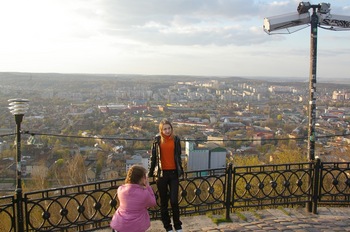
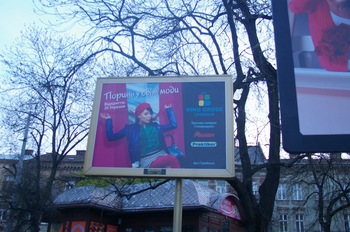
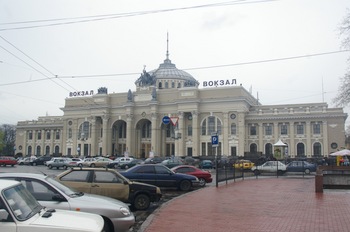
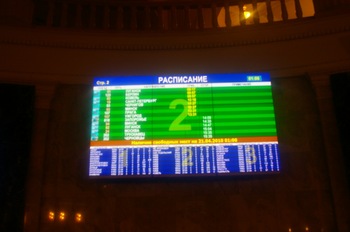
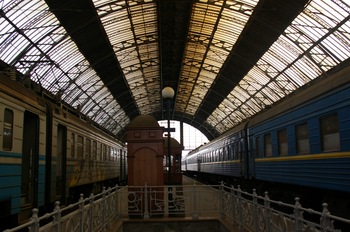
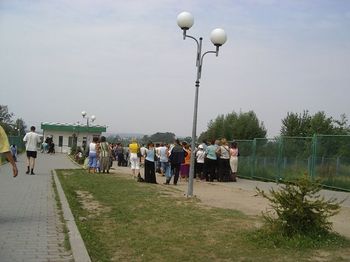
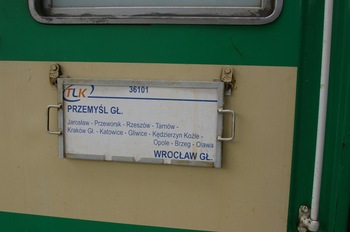
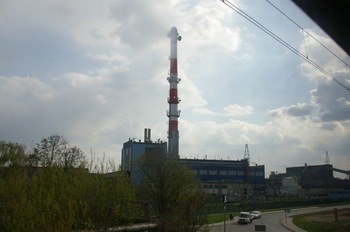




I’ve done a lot of travelling on Russian trains, and I have to say you are unlucky in having to share a carriage with the obnoxious drunk: I never had that problem, thankfully.
However, if you spend any time at all in Russia you will encounter such a person many times, be it in a cafe, bar, bus, anywhere. I had to sit next to such a person for 9 hours on an Aeroflot flight from Moscow to Yuzhno-Sakhalinsk, and I was at the point of telling the stewardess I was going to punch this chap right in the face unless he stopped misbehaving. Fortunately, another Russian chap slapped him around the head and told him to shut up and behave, and he fell asleep shortly thereafter.
Steady on, Julie Delpy has been spoken for since the Passion of Beatrice.
Interesting [FSVO “interesting”] terms for the carriage classes. “Platzkart”: German or Yiddish. “Kupe”: French, presumably. “Spalny wagon”: Russian, lit. “sleeping car”. What, if anything, does this tell us about the social and/or financial history of the railway system in Tsarist and/or Soviet Russia?
“I walked to the gate and boarded the plane. At this point I could relax. I would be asleep in my own bed that evening. As I was.”
I was expecting you to then say “…and sitting next to me on the plane was the annoying Ukranian, complete with vodka, beer and high-fives…”!
I am glad it was not so. Thank you for sharing.
If I did the math right, Lance Armstrong could have taken off at the same time and have been waiting in the VIP lounge with a cold beer waiting for you.
‘Course I might be wrong. But let’s leave statistical probabilities to the side just this once.
BTW, here in beautiful scenic Houston Texas, the surface bus route from Downtown to the International Airport takes roughly two and one half hours, and runs on one hour intervals.The fare is $1.25 (US, of course, no alternative) There is an express bus service which runs on the same interval but takes only half an hour to get to downtown. The fare is $30.00 (ditto).
Who or what is “Julie Delpy”?
(sorry, I just have never heard of one.)
Julie Delpy is a French actress, with a certain appeal to (especially male) quasi-arty film buffs of my generation, by which I mean people who were in our twenties in the 1990s. To Anglophones, she is most famous for her performances in “Three Colors: Blue”, set in Paris but featuring a mixture of Polish and French characters and written and directed by the great Polish director Krzysztof Kieslowski, and “Before Sunrise” directed by American Richard Linklatter, a film that consists entirely of Delpy and Ethan Hawke walking around Vienna over a 24 hour period and having a lengthy pretentious conversation. (They are very self aware about it though – it is a good film).
Although, Delpy is French, both films have an Austrian/Polish/Central European quality about them, which meant there was something perfect about a photograph of a young woman who looks a bit like Delpy standing on the top of a hill looking down over Lviv in soft evening light. Thus I posted the photograph, despite its only tangential relevance to the rest of the post.
(Or perhaps it was Perry de Havilland’s “Post pictures of pretty girls wherever possible” editorial guideline).
A samizdata policy still very much in effect. Well done Michael.
Very English in its tone, this website, very: Circumlocutory and baroque.